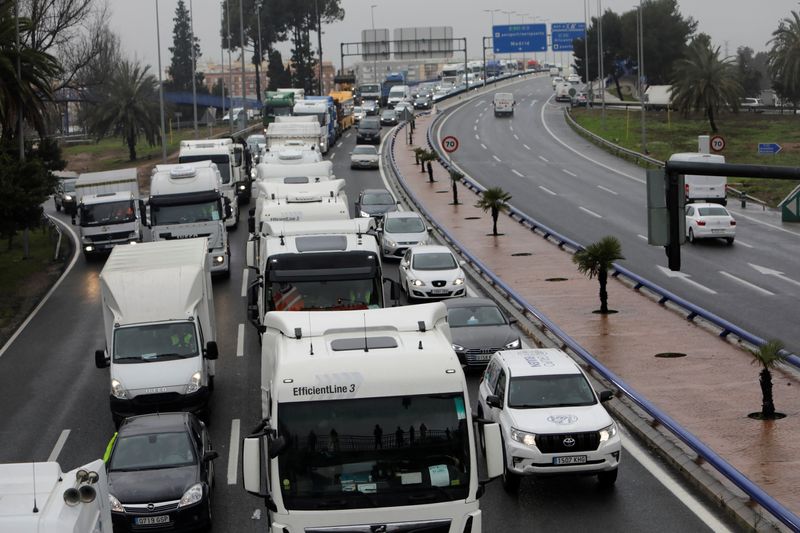MADRID (Reuters) -Spain's government agreed to pay 500 million euros ($551.35 million) in direct aid to the transport sector on Monday, hoping to end a strike by some truck drivers over surging fuel costs but organisers said the strike will continue.
"We are going to introduce a subsidy on the price of professional diesel so that this measure has a real and effective impact," Transport Minister Raquel Sanchez said after meeting with the National Road Transport Committee.
She said the measure was in line with similar actions taken in France, Portugal and Italy and would take effect from April 1. The government will not reduce VAT - value added tax - on fuel.
While the strike only involves a minority of drivers, it has caused huge traffic jams across Spain, leading some factories to halt production as they could not guarantee deliveries would be received on time.
The strike organiser, a truck drivers and small truck owners group association known as the Platform for the Defence of Transport, was not present at the meeting and said the government's announcement was insufficient.
Faced with record diesel prices, drivers went on strike last Monday to demand lower taxes and lighter regulations, with some protests turning violent.
"Until we negotiate the real problems faced by small truck drivers, there will be no suspension (of the strike)," the Platform's president, Manuel Hernandez, told Reuters, adding that their key demand is to prevent drivers from incurring losses when transport costs are higher than revenues.
Hernandez said the government proposals were "Band-Aids" that do not address what he argued is a deeper wound.
Asked about the strike continuing on Tuesday, Spain's Finance minister Nadia Calvino told a press briefing: "These are positive measures for truck drivers and those platforms that would not back (the measures) are clearly showing they do not defend the interests of this sector".
The government plan follows a consultation by the European Commission on a draft proposal for a state aid temporary crisis framework to support the EU economy in the context of surging global inflation, exacerbated by Russia's invasion of Ukraine.

Such support could be granted in any form, including guarantees, subsidised loans and limited grants to partially compensate companies, particularly intensive energy users, for energy price increases, the EU said earlier in March.
($1 = 0.9069 euro)